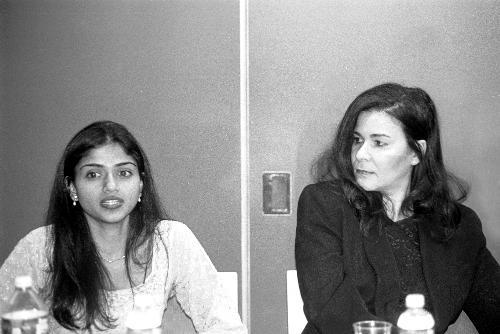
News
Pro-Palestine Encampment Represents First Major Test for Harvard President Alan Garber

News
Israeli PM Benjamin Netanyahu Condemns Antisemitism at U.S. Colleges Amid Encampment at Harvard

News
‘A Joke’: Nikole Hannah-Jones Says Harvard Should Spend More on Legacy of Slavery Initiative

News
Massachusetts ACLU Demands Harvard Reinstate PSC in Letter

News
LIVE UPDATES: Pro-Palestine Protesters Begin Encampment in Harvard Yard
Working Women Share Tales, Advice

Three prominent professional women of color told their stories of facing racial barriers and suggested ways to navigate the mostly white-male dominated corporate world in a panel discussion last night in Boylston Hall’s Ticknor Lounge.
The speakers at the second annual “Road to Success” panel focused mostly on ways to achieve justice and create equal opportunities for racial minorities.
“Success is the ability to make real changes in peoples’ lives. It is social, economic and racial justice for people of color and for immigrants,” said panelist Saru Jayaraman, the founder of New York-based Women and Youth Supporting Each Other and the Alliance for Justice, a support network for low-wage employees.
Joining Jayaraman were Marisa J. Demeo, the regional counsel of the Mexican American Legal Defense and Educational Fund’s Washington office, and Laura Randolph Lancaster, the former managing editor of Ebony and co-author of three national bestsellers with Patti LaBelle.
The panelists told the roughly 40 audience members not to be discouraged by stereotypes in the workplace.
“Racism and sexism still exist in America in a big way, but I’ve always chosen to see it as the racists’ or the sexists’ problem,” Lancaster said. “They have to be moved aside, stepped over.”
All the speakers expressed a feeling of duty to support the minority community.
“I feel obligated to people of color who are united to change this world—the accountability never stops,” Jayaraman, said. “Low income, immigrant people of color—that’s what I come from, that’s who I identify with and so they are the people I feel obligated to.”
Demeo said she took a 50 percent pay cut to leave her job at the U.S. Department of Justice to work for organizations that support the Latino community.
“While working within government structure there were limitations to how much I could do,” she said. “I looked around one day and realized that there were so many talented people there and that maybe I should give my attention to Latino organizations, where people are less willing or likely to work.”
Likewise, Lancaster said she chose to work for Ebony because she wanted to write “for black people and about black people.”
“The world doesn’t write these stories,” she said.
The event was sponsored by Latinas Unidas, South Asian Women’s Collective, and the Association of Black Harvard Women (ABHW). It was conceived by the ABHW Board last year to bring women of color from a variety of professions to share their experiences of success.
“We organized the event because we wanted experienced professionals to give students advice and to let them know what they can do now to get where they want to be in the future,” said panel moderator Jennifer N. Hawkins ’04.
The panelists urged students against becoming discouraged as they enter the workforce and to simply focus on their chosen objectives.
“The major goal I’m trying to achieve is to create better opportunities for Latina communities,” Demeo said. “Sometimes the steps are so small that it’s hard to feel successful, but as long as you are moving forward, that’s what really matters.”
Toward the end of the hour and half long event, the panelists reassured students that they don’t already have to have a concrete plan for their future.
To emphasize this point, Demeo noted that after graduating from Princeton she realized that she had no idea how to find a job. Her mother told her to go to a temp agency, and she ended up as the “sample girl” in a grocery store.
“So, don’t worry if you’re unemployed,” she said. “It’ll all work out.”
Want to keep up with breaking news? Subscribe to our email newsletter.
